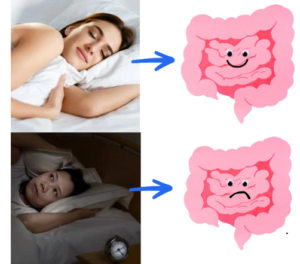Understanding the Critical Relationship Between Quality Sleep and Digestive Health
Sleep serves more than just a restorative function; it plays a crucial role in influencing our overall digestion and gut health. This intricate connection may not be immediately obvious, yet it encompasses a variety of physiological processes that work in concert. The body’s circadian rhythm, often referred to as the internal biological clock, beautifully synchronises our sleep cycles with our digestive processes. This alignment is evident as many individuals notice they tend to feel hunger at similar times each day, showcasing the body’s adeptness at maintaining harmony with natural biological cycles.
The Importance of Restorative Sleep for Enhancing Digestive Function 
Quality sleep is integral to the body’s ability to heal, rejuvenate, and restore its various systems, including the digestive system. The profound stages of sleep are particularly vital for these restorative processes. During deeper sleep cycles, the organs, tissues, and cells that constitute the digestive system not only experience relaxation but also engage in critical repair mechanisms. The body prioritises cellular repair and growth during these deep sleep phases, especially for regenerating the cells lining the digestive tract, which continuously endure wear and tear from food particles and digestive enzymes. This regeneration is essential for maintaining the integrity of the gastrointestinal lining, thereby enhancing the efficiency of digestion.
Deep sleep also plays a pivotal role in strengthening the immune system, which is especially important for the digestive system, as it contains specialised immune cells that are activated by beneficial bacteria residing in the gut. These immune cells are essential for defending the gut and the entire digestive system against harmful microorganisms, ensuring a balanced population of bacteria within the gut environment. A robust immune response aids in protecting against infections and maintaining overall gut health—two critical factors for effective digestion.
Furthermore, the organs that comprise the digestive system are instrumental in detoxification, facilitating the removal of waste and harmful substances from the body. Deep sleep enhances this detoxification process by boosting the operational efficiency of the liver and kidneys, allowing these vital organs to function optimally. This synergistic interaction between sleep and detoxification significantly contributes to overall digestive health and well-being, reinforcing the necessity of prioritising restorative sleep for maintaining a healthy body.
Understanding the Relationship Between Gut Motility and Sleep Quality
A fundamental aspect of digestion is the effective movement of food and waste through the digestive tract, a process referred to as gut motility. Notably, this process undergoes significant changes during sleep. During both deep and light sleep, the rate of gut motility decreases substantially. This reduction is a necessary adjustment that allows the digestive system to conserve energy, which is redirected towards repairing and regenerating digestive tissues. By conserving energy during sleep, the digestive process can function more efficiently when awake, thereby optimising nutrient absorption and waste elimination.
The migrating motor complex plays an essential role in the cycle of contractions that occurs during fasting periods, including during sleep. This cycle is crucial for gut motility, as it effectively clears away food particles and residues that may linger in the digestive system. This natural cleansing mechanism of the digestive tract minimises the risk of bacterial overgrowth, thereby promoting a healthy gut environment. Importantly, the migrating motor complex is most active during the night when individuals are fasting and asleep, underscoring the fundamental role of sleep in protecting the health of the digestive system.
As dawn approaches, gut motility gradually increases, preparing the digestive system to efficiently process and digest food. This escalation in motility can also trigger the first bowel movement of the day, exemplifying the finely tuned relationship between sleep and gut motility. Understanding this connection is crucial for optimising digestive health and improving overall well-being.
Investigating Hormonal Interactions Affecting Sleep and Digestive Health
Ghrelin, known as the hunger hormone, plays a crucial role in stimulating appetite. In contrast, leptin informs the brain that the stomach is full, aiding in the prevention of overeating. Together, these hormones are integral to appetite regulation, yet their functions can be disrupted by inadequate sleep.
Even a single night of poor sleep can elevate levels of ghrelin, leading to increased appetite and often prompting cravings for carbohydrates. This phenomenon, commonly referred to as feeling ‘hangry’, can also be exacerbated by a drop in leptin levels after insufficient sleep, disrupting the signals that indicate satiety. This creates a challenging scenario where individuals may overeat and make poor food choices, struggling to recognise their body’s cues to stop eating. While occasional poor sleep may not lead to dire consequences, chronic insomnia can result in significant digestive problems, including inflammation in the gut, liver disorders, gastroesophageal reflux disease, inflammatory bowel disease, and even colorectal cancer, while also contributing to weight gain.
The Impact of Sleep Disruption on Digestive Health
Disruptions in sleep can lead to a range of digestive issues. Factors such as shift work, particularly night shifts, and experiencing jet lag can significantly interfere with sleep patterns, throwing off the body’s internal clock. Moreover, consuming food late at night or having irregular meal times can negatively affect sleep quality. The circadian rhythm, which governs sleep, is tightly interconnected with natural sunlight, essential for maintaining a healthy sleep-wake cycle.
Regrettably, in today’s technology-driven society, numerous individuals spend the bulk of their daytime indoors, leading to diminished exposure to natural light. This shift has resulted in increased exposure to blue light emitted by devices such as laptops, televisions, and smartphones, which further disrupts the sleep cycle and overall sleep patterns, particularly when this exposure occurs shortly before bedtime.
The cumulative impact of these factors can result in serious digestive issues, including diarrhea, ulcers, inflammatory bowel disease, or disruption of the delicate balance between beneficial and harmful bacteria in the gut. This imbalance can also damage the gut lining, complicating the existing challenges regarding digestive health.
Enhancing Microbiome Health Through Quality Sleep
microbiome refers to the trillions of microorganisms living in the gut, predominantly comprising beneficial bacteria known as probiotics, along with viruses, fungi, and potentially harmful bacteria. These microbes are not only crucial for overall health but also for digestive health. They enhance the immune response and assist in digestion, facilitating the production of certain vitamins, enzymes, hormones, and amino acids. Recent studies have uncovered a significant connection between the microbiome and sleep, indicating that disrupted sleep or chronic insomnia can negatively affect the balance of these microbes, ultimately impacting both digestive health and overall well-being.
Exploring the Complex Dynamics Between Microbiome Health and Sleep Quality
The interplay between sleep and microbiome health is intricate and multifaceted. Poor sleep can adversely affect microbiome health, while an imbalanced microbiome can also negatively influence sleep quality. To understand this complex relationship, one study revealed a correlation between a higher abundance of specific bacterial types in the gut and faster sleep onset, along with fewer nighttime awakenings. Although this article does not delve into all findings, the key takeaway is that fostering a diverse and abundant population of beneficial bacteria in the gut is essential for achieving optimal sleep, efficient digestion, and maintaining overall health.
Examining the Links Between Stress, Sleep, and Digestive Health
A frequent outcome of stress and anxiety is disrupted sleep. Conversely, these mental health challenges can also adversely affect the physical health and functionality of the digestive system. This disruption can lead to altered gut motility and contribute to problems such as indigestion, ulcers, and irritable bowel syndrome. A critical factor in this dynamic is the role of the so-called stress hormone, cortisol.
The Impact of Cortisol on Digestive Processes
When cortisol levels rise, the body reacts by entering a fight-or-flight state. This physiological response redirects blood flow to crucial areas such as the heart, brain, lungs, and muscles, while diverting it away from the digestive system. This response prepares the individual to either confront danger or flee, a reaction that was vital for survival in ancient times.
In modern life, however, stressors are often less life-threatening, such as financial pressures, work-related stress, or insufficient sleep. While short-term redirection of blood flow may be beneficial in acute situations, chronic stress can have detrimental effects on the digestive system, particularly concerning gut motility. This can manifest as symptoms including constipation, diarrhea, indigestion, gas, and bloating. Consequently, implementing effective stress management strategies is critical for supporting both gut health and achieving quality sleep.
Ensuring sufficient sleep is essential for maintaining a healthy digestive system, as the connection between sleep and digestion is inherently intertwined. Prioritising effective sleep hygiene practices is vital for attaining restorative sleep. This includes minimising exposure to blue light from electronic devices, adhering to a consistent sleep schedule, creating a cool and dark sleep environment, avoiding food intake within two hours prior to bedtime, and ensuring ample exposure to natural light throughout the day, particularly in the morning.
References
Understanding Digestive Health and Circadian Rhythms
Exploring Sleep Dysfunction and Digestive Conditions
Examining the Link Between the Gut Microbiome and Sleep
Investigating Stress and Its Effects on the Digestive System
The Article: How Sleep Affects Your Digestive System appeared first on https://janestevensnutrition.com
The Article: Sleep’s Impact on Your Digestive System Explained appeared first on https://janestevens.net
The Article Sleep’s Impact on Digestive Health Explained Was Found On https://limitsofstrategy.com



